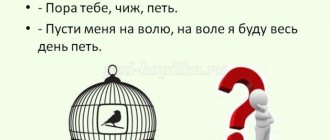Evaluation of students' oral response
ABOUT
is set in case:
1. Knowledge, understanding, and depth of student assimilation of the entire volume of program material.
2. The ability to highlight the main points in the studied material, generalize on the basis of facts and examples, draw conclusions, establish interdisciplinary and intradisciplinary connections, creatively apply the acquired knowledge in an unfamiliar situation.
3. The absence of errors and shortcomings when reproducing the studied material, when giving oral answers, eliminating individual inaccuracies with the help of additional questions from the teacher, maintaining the culture of oral speech.
ABOUT
1. Knowledge of all studied program material.
2. The ability to highlight the main points in the studied material, generalize on the basis of facts and examples, draw conclusions, establish intra-subject connections, and apply the acquired knowledge in practice.
3. Minor (not gross) errors and shortcomings when reproducing the studied material, observing the basic rules of the culture of oral speech.
ABOUT
(level of ideas combined with elements of scientific concepts):
1. Knowledge and assimilation of the material at the level of the minimum requirements of the program, difficulty in reproducing independently, the need for little assistance from the teacher.
2. Ability to work at the reproduction level, difficulties in answering modified questions.
3. The presence of a gross error, several minor ones when reproducing the studied material, a slight non-compliance with the basic rules of the culture of oral speech.
Work program for Social Studies 6th grade for 2019-2020
Explanatory note
This work program for the subject “Social Studies” (grade 6) was developed in accordance with the federal state educational standard based on the Model Program for Basic General Education in Social Studies./Work Program for Social Studies for grades 5-9. _ Social science. Working programs for the subject line of textbooks edited by L.N. Bogolyubova. Grades 5-9: a manual for teachers of general education. Institutions/ L.N. Bogolyubov, N.I. Gorodetskaya, L.F. Ivanova et al.-M.: Education, 2014.
- Personal, meta-subject and subject results
Personal:
1) education of Russian civic identity: patriotism, respect for the Fatherland, past and present of the multinational people of Russia; awareness of one’s ethnicity, knowledge of the history, language, culture of one’s people, one’s region, the foundations of the cultural heritage of the peoples of Russia and humanity; assimilation of humanistic, democratic and traditional values of multinational Russian society; fostering a sense of responsibility and duty to the Motherland;
2) the formation of a responsible attitude towards learning, the readiness and ability of students for self-development and self-education based on motivation for learning and knowledge, conscious choice and construction of a further individual educational trajectory based on orientation in the world of professions and professional preferences, taking into account sustainable cognitive interests, as well as based on the formation of a respectful attitude towards work, the development of experience of participation in socially significant work;
3) the formation of a holistic worldview that corresponds to the current level of development of science and social practice, taking into account the social, cultural, linguistic, spiritual diversity of the modern world;
4) the formation of a conscious, respectful and friendly attitude towards another person, his opinion, worldview, culture, language, faith, citizenship, history, culture, religion, traditions, languages, values of the peoples of Russia and the peoples of the world; willingness and ability to conduct dialogue with other people and achieve mutual understanding in it;
5) mastering social norms, rules of behavior, roles and forms of social life in groups and communities, including adults and social communities; participation in school self-government and public life within the limits of age competencies, taking into account regional, ethnocultural, social and economic characteristics;
6) development of moral consciousness and competence in solving moral problems based on personal choice, the formation of moral feelings and moral behavior, a conscious and responsible attitude towards one’s own actions;
7) the formation of communicative competence in communication and cooperation with peers, older and younger children, adults in the process of educational, socially useful, teaching and research, creative and other types of activities;
 formation of the value of a healthy and safe lifestyle; mastering the rules of individual and collective safe behavior in emergency situations that threaten the life and health of people, rules of conduct in transport and on the roads;
formation of the value of a healthy and safe lifestyle; mastering the rules of individual and collective safe behavior in emergency situations that threaten the life and health of people, rules of conduct in transport and on the roads;
9) formation of the foundations of an environmental culture corresponding to the modern level of environmental thinking, development of experience in environmentally oriented reflective, evaluative and practical activities in life situations;
10) awareness of the importance of family in the life of an individual and society, acceptance of the value of family life, respectful and caring attitude towards members of one’s family;
11) development of aesthetic consciousness through the development of the artistic heritage of the peoples of Russia and the world, creative activity of an aesthetic nature.
Metasubject:
1) the ability to independently determine the goals of one’s learning, set and formulate new goals for oneself in learning and cognitive activity, develop the motives and interests of one’s cognitive activity;
2) the ability to independently plan ways to achieve goals, including alternative ones, to consciously choose the most effective ways to solve educational and cognitive problems;
3) the ability to correlate one’s actions with the planned results, monitor one’s activities in the process of achieving results, determine methods of action within the framework of the proposed conditions and requirements, and adjust one’s actions in accordance with the changing situation;
4) the ability to evaluate the correctness of completing a learning task and one’s own capabilities to solve it;
5) mastery of the basics of self-control, self-esteem, decision-making and making informed choices in educational and cognitive activities;
6) the ability to define concepts, create generalizations, establish analogies, classify, independently select grounds and criteria for classification, establish cause-and-effect relationships, build logical reasoning, inference (inductive, deductive and by analogy) and draw conclusions;
7) the ability to create, apply and transform signs and symbols, models and diagrams to solve educational and cognitive problems;
 semantic reading;
semantic reading;
9) the ability to organize educational cooperation and joint activities with the teacher and peers; work individually and in a group: find a common solution and resolve conflicts based on coordinating positions and taking into account interests; formulate, argue and defend your opinion;
10) the ability to consciously use verbal means in accordance with the task of communication to express one’s feelings, thoughts and needs; planning and regulation of its activities; mastery of oral and written speech, monologue contextual speech;
11) formation and development of competence in the field of use of information and communication technologies (hereinafter referred to as ICT competence); development of motivation to master the culture of active use of dictionaries and other search engines;
(as amended by Order of the Ministry of Education and Science of Russia dated December 29, 2014 N 1644)
12) formation and development of environmental thinking, the ability to apply it in cognitive, communicative, social practice and professional guidance.
Subject:
1) formation in students of personal ideas about the basics of Russian civil identity, patriotism, citizenship, social responsibility, legal self-awareness, tolerance, commitment to the values enshrined in the Constitution of the Russian Federation;
2) understanding of the basic principles of social life, the foundations of modern scientific theories of social development;
3) acquisition of theoretical knowledge and experience in applying the acquired knowledge and skills to determine one’s own active position in public life, to solve typical problems in the field of social relations, adequate to the age of students, interpersonal relationships, including relations between people of different nationalities and religions, ages and social groups ;
4) formation of the foundations of legal consciousness for correlating one’s own behavior and the actions of other people with the moral values and norms of behavior established by the legislation of the Russian Federation, the conviction of the need to protect the rule of law by legal means and means, the ability to implement basic social roles within the limits of one’s legal capacity;
5) mastering techniques for working with socially significant information and understanding it; developing students’ abilities to draw the necessary conclusions and make reasonable assessments of social events and processes;
6) development of social outlook and formation of cognitive interest in the study of social disciplines.
Planned results of mastering the academic subject "social studies" 6th grade
Human. Human activity
The graduate will learn:
- use knowledge about the biological and social in man to characterize his nature;
- characterize the main age periods of a person’s life, features of adolescence;
- in model and real situations, highlight the essential characteristics and main types of human activity, explain the role of motives in human activity;
- characterize and illustrate with specific examples a group of human needs;
- give examples of the main types of human activity;
- perform simple practical tasks to analyze situations related to various methods of resolving interpersonal conflicts; Express your own attitude to various ways of resolving interpersonal conflicts.
The graduate will have the opportunity to learn:
- perform simple practical tasks based on situations related to human activity;
- evaluate the role of activity in human life and society;
- assess the consequences of satisfying imaginary needs, using examples to show the danger of satisfying imaginary needs that threaten health;
- use elements of cause-and-effect analysis when characterizing interpersonal conflicts;
- model the possible consequences of the positive and negative impact of the group on a person, draw conclusions.
2. Contents of the work program
Chapter I. Man in the social dimension 11 hours
Human. Individual. Individuality. Personality. Self-knowledge. Self-awareness. Human needs. The spiritual world of man. Man and activity. On the path to success in life.
Chapter II. A man among people 9 o'clock
Interpersonal relationships, their features, types. Communication, means of communication. Conflicts in interpersonal communication and ways to resolve them. Mediation in conflict resolution.
Chapter III. Moral foundations of life 7 hours
Goodness, courage and fear. Humanity.
Total repetition 7 hours
3. Thematic planning.
| № | Program section | Number of hours |
| Chapter I. Man in the social dimension | 11 | |
| Chapter II. Man among people | 9 | |
| Chapter III. Moral foundations of life | 7 | |
| Final repetition | 7 |
| Chapter 1. Man in the social dimension | |
| 1. Person - personality | 2 |
| 2. Know yourself | 2 |
| 3. Man and his activities | 2 |
| 4 Human needs | 2 |
| 5.On the path to success in life | 2 |
| 6. Repetition, generalization and systematization of knowledge on the topic “Man - Personality” | 1 |
| Chapter 2. Man among people | |
| 1. Interpersonal relationships | 2 |
| 2. Person in a group | 2 |
| 3.Communication | 2 |
| 4. Conflicts in interpersonal relationships | 2 |
| 5. Repetition, generalization and systematization of knowledge on the topic “Man among people” | 1 |
| Chapter 3. Moral foundations of life | |
| 1. Man is famous for his good deeds | 2 |
| 2. Be brave | 2 |
| 3. Man and humanity | 2 |
| 4. Repetition, generalization and systematization of knowledge on the topic “Moral foundations of life” | 1 |
| 5. Repetition, generalization and systematization of knowledge on the topic “Man and Society” | 3 |
| 6. Repetition, generalization and systematization of knowledge on the topic “Man in the system of social relations” | 4 |

